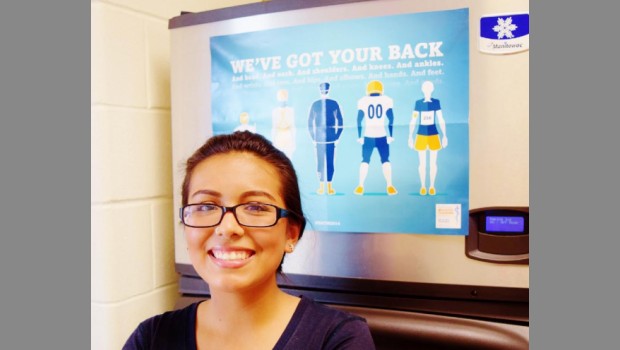
Article reposted from Savannah Now
Author: Leslie Moses
She wanted to know what not to do.
So in down time, Georgia Mesa-Herfel, 17, grabbed the thick, athletic training bible off Jillian Bensen-Eder’s gray file cabinet.
One thing she learned: Never ice an athlete’s inside elbow for long. (It causes nerve damage.)
One thing Bensen-Eder learned about the girl reading in her office: Mesa-Herfel is a very hard worker who loves learning.
The stand-out is a 2016 Youth Hero for the American Red Cross of Southeast and Coastal Georgia thanks to the nomination of Bensen-Eder, New Hampstead High’s athletic trainer from Memorial University Medical Center.
“She is always here, always trying to help, always trying to learn,” Bensen-Eder says.
Mesa-Herfel would sit in a swivel chair beside the gym in Bensen-Eder’s office, pouring over “Arnheim’s Principles of Athletic Training” to learn basics of the career.
It covers matters like insurance, too, according to Mesa-Herfel.
“We call that the ‘athletic training bible,’” Bensen-Eder says.
The teen found time to read after she set up for practice, or while football players watched their film.
Mesa-Herfel was “kind of getting a leg up on everything for the afternoon,” Bensen-Eder says.
She didn’t have to. She wanted to.
“There’s so much to know that I don’t know,” Mesa-Herfel says. “And I’m a very curious person, so there’s always something to learn.”
Two years ago, she took a weightlifting course from coach Bernard Gaither, who told her about volunteering as an athletic trainer.
“I thought it sounded cool,” Mesa-Herfel says. “So I just tried it out, and I stuck with it.”
She was one of five students helping Bensen-Eder help athletes for the 2015-16 school year.
Mesa-Herfel first planned to major in music and teach. And athletic training involves sports, which she didn’t play.
Yet the athletic world drew her into its unknown where she’d learn new things, one appeal.
Another attraction? Helping people.
That’s a Mesa-Herfel family value the teen finds satisfying.
“My family has always pushed that,” she says.
But maybe they didn’t picture this:
She recalls one late night – she left at 1 a.m. – when seven football players needed to cut tape from their sweaty feet after a game, and five others needed help with shoulder pads.
She also needed to empty and wash water bottles.
“I’m like, OK. This has to be done, so I might as well have fun,” Mesa-Herfel says.
With scissors in hand, she was like a chatty hairdresser of sorts, but with different go-to topics: The just-played game and grub.
“Yeah, sports and food, that’s mainly what guys talk about – or the coaches,” she says, laughing.
Other times, she wiped blood off jerseys with peroxide (the stain prohibits play), taped wrists, hydrated players – sometimes called shoving a water bottle to an athlete’s face – or loaded a bus with supplies.
She learned players’ quirks, like “if they smell bad,” she says with a laugh, or are barefoot-bashful.
Some athletes don’t like their feet to show, so a sock covered those athletes’ toes when Mesa-Herfel wrapped their ankles.
She can laugh and joke with the best of them, says Gaither, New Hampstead’s former football coach.
“But when it’s time to conduct business, she’s no-nonsense, and I appreciate that about her,” he says.
New Hampstead played Calvary Day School their first game, leaving multiple players from the Bloomingdale school wounded.
“We had a succession of injuries,” Bensen-Eder says.
“As a coach, I can’t take time away from game,” Gaither says.
But skilled athletic trainers ease his mind so he can focus on plays. So he partly credits the crew for New Hampstead’s 7-3 record.
“You have to be very outgoing, but very smart,” Mesa-Herfel says.
When outgoing, she chats up the players.
But give her an athlete sidelined by injury, and she’s serious about keeping him hydrated and guarded from being trampled. She’s professional, calling his emergency contact, too, notifying parents.
Her work paved strong connections with peers and their parents during the last two years.
Spending 8:30 a.m. to 8 p.m. with athletes is an “insane amount of time together,” according to Mesa-Herfel.
She was just stepping toward a career she thinks she’ll love. Her heart wasn’t in teaching music anyway.
She’ll graduate from Georgia Southern University with a degree in athletic training, and get her doctorate in physical therapy from Armstrong State University.
That’s what Bensen-Eder recommends.
Bensen-Eder also playfully says that Mesa-Herfel will be in the top of her class. She believes in the “amazing, hardworking young lady” who willingly helps with whatever needs to be done.
“She kind of held herself to a higher standard,” Bensen-Eder says.
Then maybe Mesa-Herfel will aid acrobats in Cirque du Soleil.
Or maybe she’ll help high school athletes, doing what Bensen-Eder does now.
That “would be pretty cool,” Mesa-Herfel says.
For now, the New Hampstead alumna returns to the field this summer, ready to tape and aid the school’s football players.
“I mean, it doesn’t really seem like work to me,” Mesa-Herfel says.